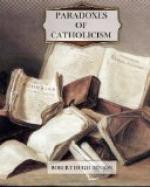Now those who stand without the walls of the City of Peace know nothing, it is true, of the life that its citizens lead within, nothing of the harmony and consolation that Catholicism alone can give. Yet of certain points, it may be, in the large outlines of that city against the sky, of the place it occupies in the world, of its wide effect upon human life in general, it may very well be that these detached observers may know more than the devout who dwell at peace within. Let us, then, consider their reflections not necessarily as wholly false; it may be that they have caught glimpses which we have missed and relations which either we take too much for granted or have failed altogether to see. It may be that these accusations will turn out to be our credentials in disguise.
I. Every world-religion, we are told, worthy of the name has as its principal object and its chief claim to consideration its establishing or its fostering of peace among men. Supremely this was so in the first days of Christianity. It was this that its great prophet predicted of its work when its Divine Founder should come on earth. Nature shall recover its lost harmony and the dissensions of men shall cease when He, the Prince of Peace, shall approach. The very beasts shall lie down together in amity, the lion and the lamb and the leopard and the kid. Further, it was the Message of Peace that the angels proclaimed over His cradle in Bethlehem; it was the Gift of Peace which He Himself promised to His disciples; it was the Peace of God which passeth knowledge to which the great Apostle commended his converts. This then, we are told, is of the very essence of Christianity; this is the supreme benediction on the peacemakers that they shall be called the children of God.
Yet, when we turn to Catholicism, we are bidden to see in it not a gatherer but a scatterer, not the daughter of peace but the mother of disunion. Is there a single tormented country in Europe to-day, it is rhetorically demanded, that does not owe at least part of its misery to the claims of Catholicism? What is it but Catholicism that lies at the heart of the divided allegiance of France, of the miseries of Portugal, and of the dissensions of Italy? Look back through history and you will find the same tale everywhere. What was it that disturbed the politics of England so often from the twelfth to the fifteenth century, and tore her in two in the sixteenth, but the determined resistance of an adolescent nation to the tyranny of Rome? What lay behind the religious wars of Europe, behind the fires of Smithfield, the rack of Elizabeth, and the blood of St. Bartholomew’s Day but this intolerant and intolerable religion which would come to no terms even with the most reasonable of its adversaries? It is impossible, of course, altogether to apportion blame, to say that in each several instance it was the Catholic that was the aggressor; but at least it is true to say that it was Catholic principles that were the occasion and Catholic claims the unhappy cause of all this incalculable flood of human misery.




